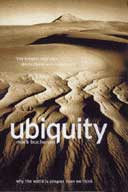 Some of the most interesting new thinking these days is being done by people who throw frozen potatoes against a wall and watch how they shatter. No, I'm not kidding. Scientists are using icy shards of smashed spuds to understand a whole range of previously inexplicable phenomena. Studying so-called non-equilibrium physics, at first glance, seems beyond esoteric, deeply obscure. But when you read what the bits of potato can tell us about predicting earthquakes or the ebb and flow of human history, it may be time to head for the vegetable market.
Some of the most interesting new thinking these days is being done by people who throw frozen potatoes against a wall and watch how they shatter. No, I'm not kidding. Scientists are using icy shards of smashed spuds to understand a whole range of previously inexplicable phenomena. Studying so-called non-equilibrium physics, at first glance, seems beyond esoteric, deeply obscure. But when you read what the bits of potato can tell us about predicting earthquakes or the ebb and flow of human history, it may be time to head for the vegetable market.
It's a safe assumption that frozen potatoes, flung against the wall, will break into bits along random, unpredictable lines. After all, no two potatoes are alike, at least not outside the cloning laboratory. Nor do they hit the same place on a wall, at the same angle, at the same speed. It's simply impossible to duplicate or-crucially-predict the effects of impact. Similarly, any student of geology will tell you that earthquakes are always different and they simply cannot be predicted. So too the currents of human history, the stock markets, the course of rivers and so on. Until now, chaos theory has been the only way of looking at this notion of utter unpredictability. Things that are in a state of permanent flux and show no trends towards order or disorder are the model for chaos theory. Our frozen potato men beg to differ.
It's not that they think you can immediately impose order on the naturally disorderly by counting potato shards. But the complicated mathematical formulae that they've devised, after carefully tabulating every little bit of frozen spud on the laboratory floor, is helping them understand the nature of chaos. It seems that unpredictable systems like earthquake geology or human history do follow a pattern. But it's a pattern so complex and almost microscopic, that it is almost imperceptible. All of this is at a very early stage, but if the potato people can really help us start predicting the unpredictable, the world as we know it will change beyond belief.
Here in Nepal, we'll be able to plan for major earthquakes. We'll have a window on the swings and roundabouts of the global financial markets, and we may even be able to find out what history has in store. I daresay the Nepal Development Forum might take delivery of some frozen potatoes, to help them understand how the vagaries of fortune and finance influence their tasks and cash flow. For it seems to me that the very notion of development, as pursued at the moment, could be wrong. Last month's human development index, while in many respects a superb piece of work, presented Nepal's efforts to curb poverty as a logical system that would be in equilibrium if only all the inputs and conditions were right. Poverty-the report seemed to argue-would dissipate with better governance, social equity and so on. I wonder if the reality isn't completely the opposite.
The potato people would explain to their colleagues in the development business that the condition of society can never be a predictable system, that no matter how many inputs you get right, something else will distort your result. Before non-equilibrium thinking started to take hold, this would be a bleak assessment, rightly condemned by those who work to bring dignity and hope to the deprived. Now the science of "ubiquity", as it's become known, offers real prospects for understanding, if not a quick fix for deprivation and underdevelopment. Crucially, the patterns of qualitative change in social conditions could just emerge from the statistical morass that exists at the moment.
Theoretical physics has to be wild, driven by forces beyond the fringe, if it is to make new discoveries and offer understanding. There can be no orthodoxy, no conservatism, no mantras or priesthood clinging to ideas. Ubiquity has the potential to make all of our lives more explicable, less blame-ridden. It could transform politics and economics, bring fairness and competence within reach of almost any society.
Or it could simply be a madcap notion that will shatter into smaller bits as it is picked apart by scientific peer groups and academics. It's time to buy some potatoes. If you can afford them...
Ubiquity: The Science of History. or Why the World Is Simpler Than We Think by Mark Buchanan is published by Phoenix, UK



